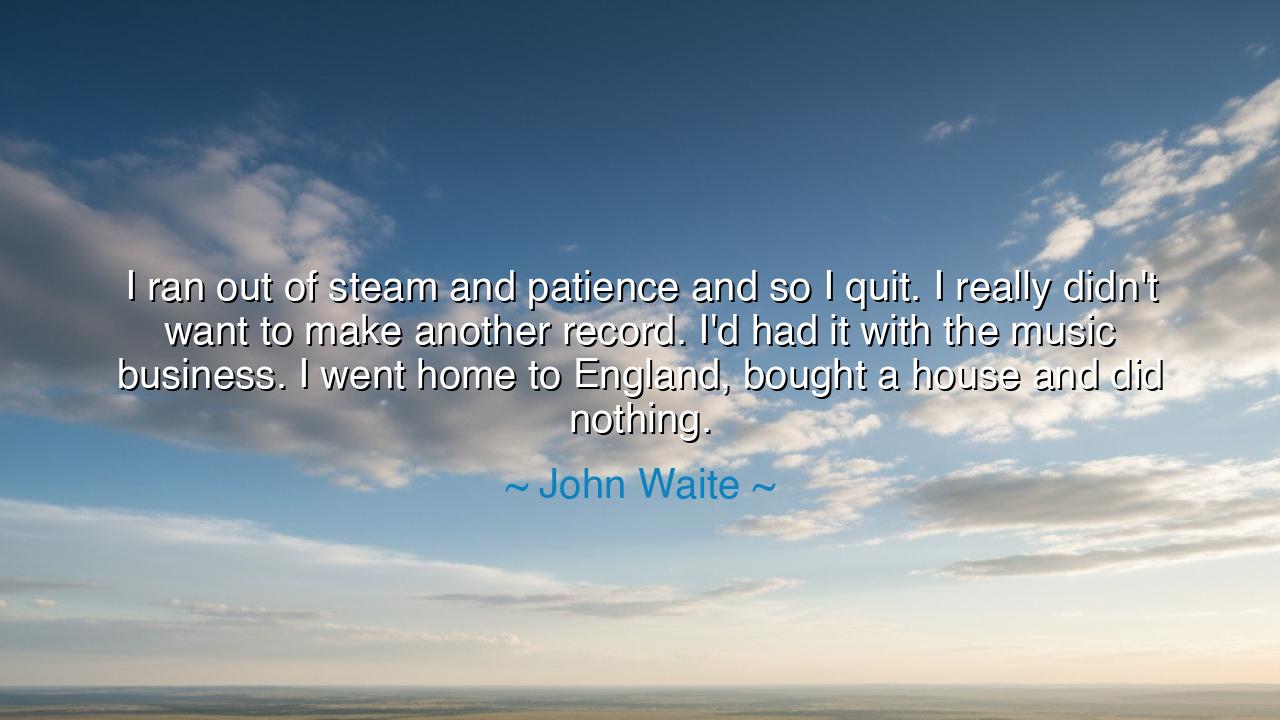
I ran out of steam and patience and so I quit. I really didn't
I ran out of steam and patience and so I quit. I really didn't want to make another record. I'd had it with the music business. I went home to England, bought a house and did nothing.






Hear the confession of John Waite, who laid bare the truth of his own journey: “I ran out of steam and patience and so I quit. I really didn’t want to make another record. I’d had it with the music business. I went home to England, bought a house and did nothing.” In these words we hear not only the lament of an artist weary of his craft, but the timeless cry of every soul that has reached the limit of endurance. They remind us that even those who seem unshakable are still human, and that there is wisdom in stepping back when the fire of passion has burned to embers.
He speaks first of running out of steam and patience. These are the twin engines of all great endeavor: energy to press forward and patience to endure its trials. Without them, even the most talented falters. Waite admits that both were spent. To confess such exhaustion is not weakness, but honesty—for no spirit can burn endlessly without rest, no heart can pour itself into labor without renewal. This is the truth the ancients knew when they spoke of seasons: that life is not endless summer, but a cycle of growth, harvest, and fallow.
Then he declares, “I quit.” These words, often seen as shameful, here reveal their nobility. For to quit at the right moment is sometimes the bravest act. The warrior who retreats to live another day, the statesman who lays down office when his spirit is spent, the artist who steps away rather than create without heart—these all show a courage greater than stubbornness. Waite’s withdrawal from the music business was not the end of his story, but a pause, a moment of reclamation, where he chose life over endless struggle.
History gives us examples of such choices. Consider Cincinnatus of Rome, who, when given supreme power to save the state, returned to his fields when the crisis had passed. He could have clung to glory, but he chose rest and simplicity. Or think of the poet Rimbaud, who abandoned literature in youth, weary of the craft, and chose another path entirely. Though controversial, his silence became as legendary as his words. These stories, like Waite’s, remind us that the value of a life is not measured only in ceaseless production, but in the wisdom to know when to stop.
Waite’s retreat to England, his purchase of a house, his season of doing nothing, speaks to the ancient need for stillness. After storms, the earth must lie quiet. After war, cities must rebuild in silence. After years of pouring forth song, the singer too must dwell in quietness. What seems like idleness is in truth restoration. The seed cannot sprout without winter; the artist cannot create without rest. Waite’s “doing nothing” was not defeat—it was the soil from which future strength might grow.
The deeper meaning of his words is this: even the most passionate vocation can become a burden when joy is lost. To continue without patience or steam is to hollow oneself out. True wisdom is not only in persistence, but in discernment—knowing when to walk away. This is not a call to abandon at the first hardship, but to recognize when a season has ended, and to honor that ending with grace.
The lesson is clear: do not fear rest, and do not despise stepping back. Life is not only about striving, but also about renewal. Practical actions follow: when your energy wanes, seek rest before collapse. When your patience is consumed, do not force creation born of bitterness. Give yourself space, whether in silence, in nature, or in simple living. For in that pause, the spirit gathers itself again. And when you return, if you choose to return, your work will be born not of compulsion, but of genuine fire.
Thus, John Waite’s words, though they speak of quitting, are in truth a hymn to wisdom. To know your limits, to honor your exhaustion, to reclaim your life apart from the demands of the world—this too is victory. For only the one who rests can rise again, and only the one who dares to stop can one day begin anew.






AAdministratorAdministrator
Welcome, honored guests. Please leave a comment, we will respond soon